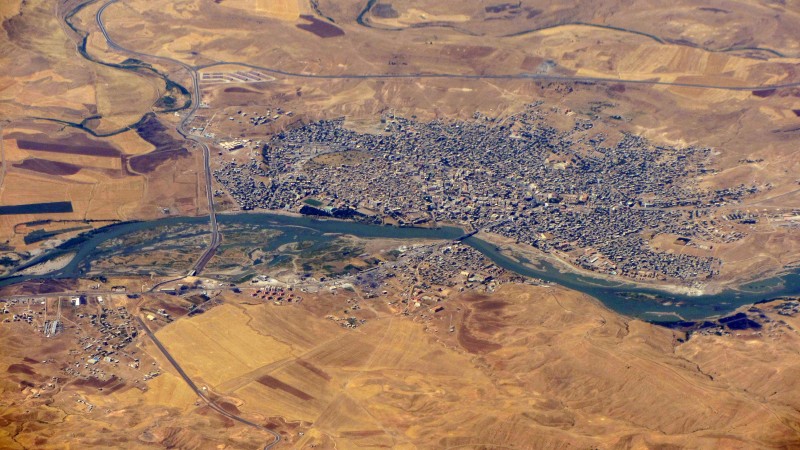
Aerial shot of Cizre, Turkey. Wiki image.
In the last two weeks Turkish authorities have imposed, lifted, reimposed and lifted once more a curfew on the Kurdish-populated town of Cizre on the Syrian border, close to where the brutal ISIS group has conquered swathes of Middle Eastern territory.
The curfews were introduced to combat the activities of the outlawed Kurdistan Workers’ Party (PKK), that Ankara once declared a tenuous truce with, but which has re-emerged as an enemy in recent months.
During the imposed curfew on Cizre town, at least 21 civilians were killed according to the Pro-Kurdish People's Democratic Party (HDP).
A curfew has been in place in the province of #Cizre last week where 21 civilians have been killed #CizreUnderAttack pic.twitter.com/5WewE2LvQ5
— HDP English (@HDPenglish) September 10, 2015
The government says all the dead were militants fighting for the PKK.
In a General Election in June, HDP passed the parliamentary threshold, taking over 13% of the vote and stripping the ruling Justice and Development Party (AKP) of its precious parliamentary majority.
The parties remaining in the parliament could not secure a coalition agreement and, as a result, snap elections were scheduled for November 1.
Shortly after the June elections, a suicide-bomb attack on July 20 killed 32 people in the town of Suruc, most of them young Kurdish activists coordinating efforts to deliver aid to the people of the Kurdish-populated Syrian town of Kobane, who have been battered by fighting between local militias and ISIS.
This caused outrage and strengthened accusations that AKP was at best a passive force in the struggle against ISIS, who are believed to have been behind the Suruc attack.

Collage of Suruc victims, tweeted by @SarkawtShams on July 22nd.
Following the bombing, the PKK reacted by killing two Turkish soldiers.
In response, the Turkish government bombed both ISIS and PKK strongholds in Iraq. The attacks on the PKK were the first since late 2012, when a peace-process was in place.
Inside Turkey, political tensions have continued to escalate, with reports of widespread attacks on the offices of HDP.
The party's headquarters in Ankara were set ablaze, as were several other offices throughout the country.
VIDEO – Turkey: Nationalist protesters destroy pro-Kurdish HDP headquarters in Ankara http://t.co/1MfqLSni9T pic.twitter.com/xcooHcTDdn
— FRANCE 24 English (@France24_en) September 9, 2015
Despite this, a delegation from HDP headed towards Cizre, attempting to bring an end to the curfew.
Here are some photos from the march: pic.twitter.com/CXMEL4MYcw
— HDP English (@HDPenglish) September 9, 2015
During this period of instability and conflict, several journalists have been deported, including the Dutch freelance journalist Frederike Geerdink, for reporting on Kurdish issues.







1 comment